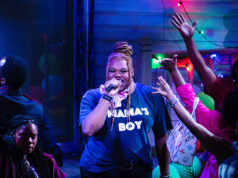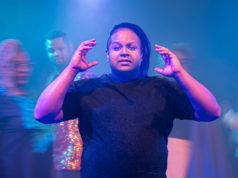Sparked by the L.A. riots following the videotaped police beating of Rodney King and the success of John Singleton’s movie Boyz N the Hood, Hollywood produced a string of films in the early 1990s about young Black men that almost always included a scene with their main characters being terrorized by racist white cops. That story point became so common in “hood movies” that Rusty Cundieff’s 1994 comedy Fear of a Black Hat parodied the trope by having its rapper protagonist held at gunpoint by an overzealous security guard and pointing out the crowd of people videotaping the incident, plus one woman executing an oil painting of it, plus one man making a life-size papier-mâché sculpture of it.
That scene has stayed with me because it’s funny but also because it makes a point about art: Simply depicting police brutality isn’t enlightening. You have to do the unglamorous work of commenting on it trenchantly and fitting it into the framework of a drama to make an audience respond to it. When you don’t, you’ve made “trauma porn,” the newfangled phrase that describes something that’s been with us for a while. TCU Theatre’s new production For Bo: A Play Inspired by the Murder of Botham Jean by Officer Amber Guyger is available to see online through this weekend, and I’m afraid this work about the 2018 murder of a Black man in his own Dallas apartment is short on reflection and craftsmanship.
Written by TCU professor Ayvaunn Penn, the play contains no live action. Rather, the story plays out in a series of paintings and drawings done by students from different institutions, including Harding University in Arkansas, where Botham Jean graduated from. The pictures are executed in a variety of styles, some of which purposefully recall courtroom sketches. The play started out as a staged reading in February, and in keeping with the spirit of that, voice actors read out the dialogue over the pictures to tell the lightly fictionalized story of “Bo Jones” (voiced by Nijel Smith), who is watching TV and eating ice cream on his couch when Officer “Amy Guy” (voiced by Marielle Wyatt), who’s coming off duty and not paying attention because she’s sexting her married boyfriend and fellow officer, enters the wrong apartment, mistakes Bo for an intruder, and kills him with her service weapon.
There’s hardly any structure at all to this, which would matter less if the set pieces hit more consistently. On that score, there’s one gratifying flash of outrage when Bo comes back from the dead to castigate his brother “B.” (voiced by Gabriel Woodard) for giving Amy a hug in the courtroom after the jury convicted her of his murder. This scene near the beginning is meant to be bookended by another one near the end when B. tells us that the gesture of forgiveness was for his own good rather than the killer’s, but the latter scene isn’t presented with the same force, nor is it built up to successfully.
The omniscient narrator (voiced by Alanna Stern) has nothing useful to add to the proceedings. Neither does the chorus of Black Twitter voices commenting on the trial, and while that’s by design, we don’t receive anything sharp about social media. Penn should have looked at white Twitter, hideous though that prospect is, and the way these platforms enable white supremacists. The bit with Amy babbling away in her cell while another inmate (voiced by Larissa Marks) tries to figure out what her cellmate is in prison for could have been powerful with more work. Too often this play comes off as a mass of undifferentiated thoughts.
We’ve seen recently that even Derek Chauvin’s conviction hasn’t been enough to keep white cops from murdering unarmed Black people, so we need theater, movies, and visual art to address this. (Hell, if somebody can create a powerful papier-mâché sculpture about this subject, let’s have it.) In a city where we have yet to see justice for Atatiana Jefferson, For Bo could have been a play for the moment. Too bad it lets the moment slip.











